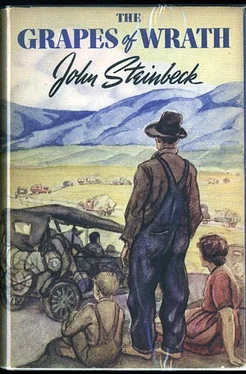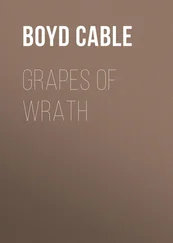John Steinbeck - The Grapes of Wrath
Здесь есть возможность читать онлайн «John Steinbeck - The Grapes of Wrath» весь текст электронной книги совершенно бесплатно (целиком полную версию без сокращений). В некоторых случаях можно слушать аудио, скачать через торрент в формате fb2 и присутствует краткое содержание. Город: New York, Год выпуска: 1939, Издательство: The Viking Press-James Lloyd, Жанр: Классическая проза, на английском языке. Описание произведения, (предисловие) а так же отзывы посетителей доступны на портале библиотеки ЛибКат.
- Название:The Grapes of Wrath
- Автор:
- Издательство:The Viking Press-James Lloyd
- Жанр:
- Год:1939
- Город:New York
- ISBN:нет данных
- Рейтинг книги:5 / 5. Голосов: 1
-
Избранное:Добавить в избранное
- Отзывы:
-
Ваша оценка:
- 100
- 1
- 2
- 3
- 4
- 5
The Grapes of Wrath: краткое содержание, описание и аннотация
Предлагаем к чтению аннотацию, описание, краткое содержание или предисловие (зависит от того, что написал сам автор книги «The Grapes of Wrath»). Если вы не нашли необходимую информацию о книге — напишите в комментариях, мы постараемся отыскать её.
The Grapes of Wrath — читать онлайн бесплатно полную книгу (весь текст) целиком
Ниже представлен текст книги, разбитый по страницам. Система сохранения места последней прочитанной страницы, позволяет с удобством читать онлайн бесплатно книгу «The Grapes of Wrath», без необходимости каждый раз заново искать на чём Вы остановились. Поставьте закладку, и сможете в любой момент перейти на страницу, на которой закончили чтение.
Интервал:
Закладка:
And the children came.
If Mary takes that doll, that dirty rag doll, I got to take my Injun bow. I got to. An’ this roun’ stick—big as me. I might need this stick. I had this stick so long—a month, or maybe a year. I got to take it. And what’s it like in California?
The women sat among the doomed things, turning them over and looking past them and back. This book. My father had it. He liked a book.
Pilgrim’s Progress. Used to read it. Got his name in it. And his pipe—still smells rank. And this picture—an angel. I looked at that before the fust three come—didn’t seem to do much good. Think we could get this china dog in? Aunt Sadie brought it from the St. Louis Fair. See? Wrote right on it. No, I guess not. Here’s a letter my brother wrote the day before he died. Here’s an old-time hat. These feathers—never got to use them. No, there isn’t room.
How can we live without our lives? How will we know it’s us without our past? No. Leave it. Burn it.
They sat and looked at it and burned it into their memories.
How’ll it be not to know what land’s outside the door? How if you wake up in the night and know—and know the willow tree’s not there? Can you live without the willow tree? Well, no, you can’t. The willow tree is you. The pain on that mattress there—that dreadful pain—that’s you.
And the children—if Sam takes his Injun bow an’ his long roun’ stick, I get to take two things. I choose the fluffy pilla. That’s mine.
Suddenly they were nervous. Got to get out quick now. Can’t wait. We can’t wait. And they piled up the goods in the yards and set fire to them. They stood and watched them burning, and then frantically they loaded up the cars and drove away, drove in the dust. The dust hung in the air for a long time after the loaded cars had passed.
CHAPTER 10
WHEN THE TRUCK had gone, loaded with implements, with heavy tools, with beds and springs, with every movable thing that might be sold, Tom hung around the place. He mooned into the barn shed, into the empty stalls, and he walked into the implement leanto and kicked the refuse that was left, turned a broken mower tooth with his foot. He visited places he remembered—the red bank where the swallows nested, the willow tree over the pig pen. Two shoats grunted and squirmed at him through the fence, black pigs, sunning and comfortable. And then his pilgrimage was over, and he went to sit on the doorstep where the shade was lately fallen. Behind him Ma moved about in the kitchen, washing children’s clothes in a bucket; and her strong freckled arms dripped soapsuds from the elbows. She stopped her rubbing when he sat down. She looked at him a long time, and at the back of his head when he turned and stared out at the hot sunlight. And then she went back to her rubbing.
She said, “Tom, I hope things is all right in California.” He turned and looked at her. “What makes you think they ain’t?” he asked.
“Well—nothing. Seems too nice, kinda. I seen the han’bills fellas pass out, an’ how much work they is, an’ high wages an’ all; an’ I seen in the paper how they want folks to come an’ pick grapes an’ oranges an’ peaches. That’d be nice work, Tom, pickin’ peaches. Even if they wouldn’t let you eat none, you could maybe snitch a little ratty one sometimes. An’ it’d be nice under the trees, workin’ in the shade. I’m scared of stuff so nice. I ain’t got faith. I’m scared somepin ain’t so nice about it.”
Tom said, “Don’t roust your faith bird-high an’ you won’t do no crawlin’ with the worms.”
“I know that’s right. That’s Scripture, ain’t it?”
“I guess so,” said Tom. “I never could keep Scripture straight sence
I read a book name ’The Winning of Barbara Worth’.”
Ma chuckled lightly and scrounged the clothes in and out of the bucket. And she wrung out overalls and shirts, and the muscles of her forearms corded out. “Your Pa’s pa, he quoted Scripture all the time. He got it all roiled up, too. It was the Dr. Miles’ Almanac he got mixed up. Used to read ever’ word in that almanac out loudletters from folks that couldn’t sleep or had lame backs. An’ later he’d give them people for a lesson, an’ he’d say, ’That’s a par’ble from Scripture.’ Your Pa an’ Uncle John troubled ’im some about it when they’d laugh.” She piled wrung clothes like cord wood on the table. “They say it’s two thousan’ miles where we’re goin’. How far ya think that is, Tom? I seen it on a map, big mountains like on a post card, an’ we’re goin’ right through ’em. How long ya s’pose it’ll take to go that far, Tommy?”
“I dunno,” he said. “Two weeks, maybe ten days if we got luck. Look, Ma, stop your worryin’. I’m a-gonna tell you somepin about bein’ in the pen. You can’t go thinkin’ when you’re gonna be out. You’d go nuts. You got to think about that day, an’ then the nex’ day, about the ball game Sat’dy. That’s what you got to do. Ol’ timers does that. A new young fella gets buttin’ his head on the cell door. He’s thinkin’ how long it’s gonna be. Whyn’t you do that? Jus’ take ever’ day.”
“That’s a good way,” she said, and she filled up her bucket with hot water from the stove, and she put in dirty clothes and began punching them down into the soapy water. “Yes, that’s a good way. But I like to think how nice it’s gonna be, maybe, in California. Never cold. An’ fruit ever’place, an’ people just bein’ in the nicest places, little white houses in among the orange trees. I wonder—that is, if we all get jobs an’ all work—maybe we can get one of them little white houses. An’ the little fellas go out an’ pick oranges right off the tree. They ain’t gonna be able to stand it, they’ll get to yellin’ so.”
Tom watched her working, and his eyes smiled. “It done you good jus’ thinkin’ about it. I knowed a fella from California. He didn’t talk like us. You’d of knowed he come from some far-off place jus’ the way he talked. But he says they’s too many folks lookin’ for work right there now. An’ he says the folks that pick the fruit live in dirty ol’ camps an’ don’t hardly get enough to eat. He says wages is low an’ hard to get any.”
A shadow crossed her face. “Oh, that ain’t so,” she said. “Your father got a han’bill on yella paper, tellin’ how they need folks to work. They wouldn’t go to that trouble if they wasn’t plenty work. Costs ’em good money to get them han’bills out. What’d they want ta lie for, an’ costin’ ’em money to lie?”
Tom shook his head. “I don’t know, Ma. It’s kinda hard to think why they done it. Maybe—” He looked out at the hot sun, shining on the red earth.
“Maybe what?”
“Maybe it’s nice, like you says. Where’d Grampa go? Where’d the preacher go?”
Ma was going out of the house, her arms loaded high with the clothes. Tom moved aside to let her pass. “Preacher says he’s gonna walk aroun’. Grampa’s asleep here in the house. He comes in here in the day an’ lays down sometimes.” She walked to the line and began to drape pale blue jeans and blue shirts and long gray underwear over the wire.
Behind him Tom heard a shuffling step, and he turned to look in. Grampa was emerging from the bedroom, and as in the morning, he fumbled with the buttons of his fly. “I heerd talkin’,” he said. “Sons-a-bitches won’t let a ol’ fella sleep. When you bastards get dry behin’ the ears, you’ll maybe learn to let a ol’ fella sleep.” His furious fingers managed to flip open the only two buttons on his fly that had been buttoned. And his hand forgot what it had been trying to do. His hand reached in and contentedly scratched under the testicles. Ma came in with wet hands, and her palms puckered and bloated from hot water and soap.
Читать дальшеИнтервал:
Закладка:
Похожие книги на «The Grapes of Wrath»
Представляем Вашему вниманию похожие книги на «The Grapes of Wrath» списком для выбора. Мы отобрали схожую по названию и смыслу литературу в надежде предоставить читателям больше вариантов отыскать новые, интересные, ещё непрочитанные произведения.
Обсуждение, отзывы о книге «The Grapes of Wrath» и просто собственные мнения читателей. Оставьте ваши комментарии, напишите, что Вы думаете о произведении, его смысле или главных героях. Укажите что конкретно понравилось, а что нет, и почему Вы так считаете.











